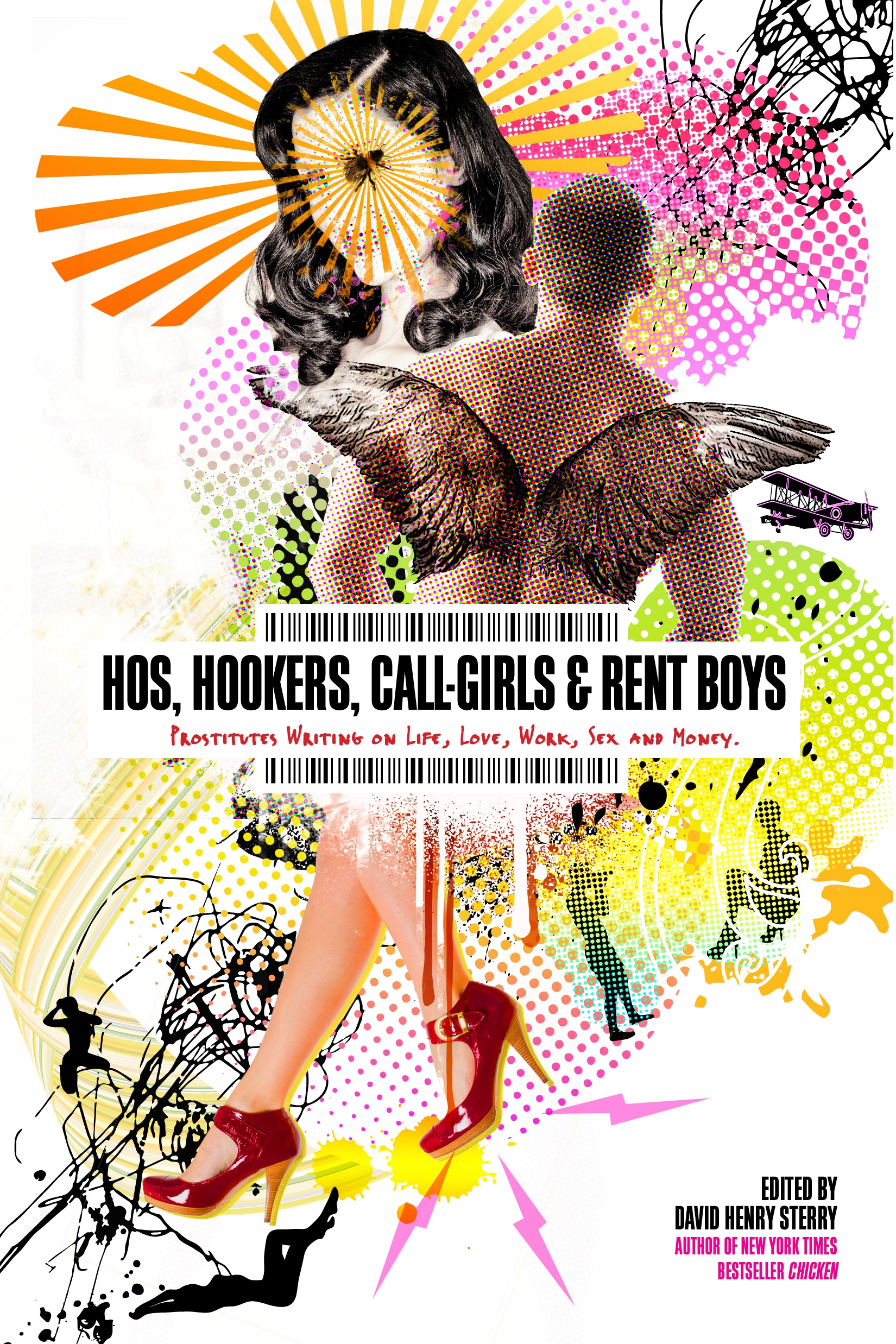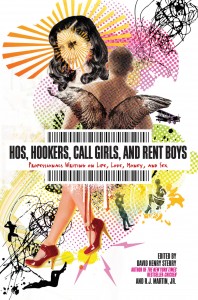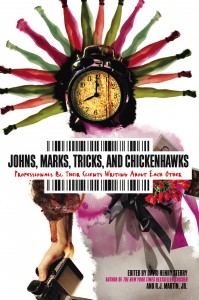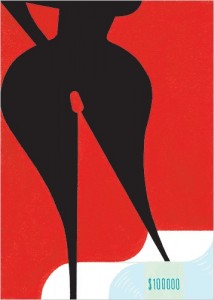Interview with David Henry Sterry for Johns Marks Ticks & Chickenhawks in San Francisco Weekly by Chris Hall
Tag: Hookers
When I first came out as an ex-sex worker, I started getting invited to prostitute and sex worker conferences. There are two distinct groups who inhabit this world: decriminalizationists and abolitionists. Decriminalizationist conferences are populated by academics, policy wonks and activists, plus a few current and former hos, hookers, call girls and rent boys. Abolitionist conferences are populated by much the same, plus politicians and law-enforcement. Both groups are evangelical, rhetorical and theoretical. Statistics are bandied about, dogma is flung and resolutions are passed. The decriminalizationists keep screaming “Decriminalize sex work!” The abolitionists keep screaming “Sex work is slavery!” and want human traffickers to be hunted down like dogs.
I first met Laura Agustín at a conference in Brussels and was immediately struck by how different she was from all the people I met on either side of the decriminalization/abolitionist divide. First of all, she had a sense of humor. This alone was shocking in either world. But she also had a calm reasonableness about her. She wanted to hear what other people have to say, basically unheard of in either camp. On top of that, the things she had to say were so smart and counter-intuitive. And they all made sense. What she had to say explained so much about why so much money is so foolishly wasted when it comes to actually pursuing traffickers. And why human beings with very few resources continuously get the short end of the stick when it comes to choosing where they live and work, and determining their own destiny. At these conferences, there are certain people you connect with in deep meaningful ways. Laura and I made just such a connection, and it has remained fertile. I read her book, Sex at the Margins, which challenged all the conventional ideas continuously trotted out about migration, sex work and trafficking. She’s one of the few people talking about this subject who will acknowledge the mind-boggling complexity of these issues, which everyone else seems to want to simplify to suit their own needs and grind their own axes. This book led to Laura Agustín — now known as The Naked Anthropologist — becoming an international expert in this emotionally charged arena. Her blog is now one of the go-to resources for well-researched, well-reasoned, sane debate about selling sex for money, crossing borders to work and the reality of what is and is not trafficking.
When she told me she had been invited by the BBC to participate in a debate at the EndHumanTrafficking event in Egypt, I just knew that the fur was going to fly. Sure enough, with her patented calm, unflappable, intellectual yet accessible style, she managed to invoke the wrath of many present and become the target of the wrath of an Academy Award winner in high hooker heels.
DHS: So, Laura, how did you come to be invited to this event?
LAURA: BBC Television was holding one of their World Debates there and invited me. The event itself was limited to particular UN agencies, business leaders and guests of the Egyptian president’s wife – plus several movie actors. It was the kind of event to which you only invite those who agree with you. But the BBC wanted to do a debate, which means they had to get in at least one person who would disagree.
DHS: Yes, those British have some crazy ideas about presenting different sides of an issue don’t they? Haven’t they learned anything from Fox News?
LAURA: Apparently not.
DHS: I saw who the other panelists were: the head of Interpol, an ex-victim of trafficking and a guy who personally saves sex slaves. Didn’t they all see trafficking as it’s traditionally and hysterically presented by the media?
LAURA: It was an incredibly stacked deck, four against one, so it was never going to be a real debate. But I went for the chance to reach the television audience. The BBC World Service is a 24-hour international news channel watched all over the planet, so in my head I was reaching people interested in trafficking issues anywhere who might have doubts about the way trafficking is usually talked about.
DHS: Doubts about what? Don’t we know human trafficking is the greatest scourge of the 21st century? Aren’t millions of people being trafficked as we speak?
LAURA: I try to break down these huge generalisations. Some people are working in conditions that look like traditional slavery, but a lot are undocumented migrants with debts to pay, workers under the age of 18 and people who would rather sell sex than do any of the other jobs open to them. People who say there are 30 million slaves in the world are including all those and many more.
DHS: Wait a minute, I thought we were talking about trafficking. Where does slavery come in?
LAURA: Originally the term trafficking referred to certain kinds of illegal moving of people across borders, but that has changed. Anti-prostitutionists have defined prostitution as violence, rape and now trafficking, but the new word is slavery. I realise some think this is a way to raise consciousness about injustice, but it is confusing to call everyone slaves and erases whatever ability to maneuver lots of people have.
DHS: The setting sounds unbelievable — the Temple of Luxor — how did you feel getting up on that stage?
LAURA: It felt surreal. Not long ago I was an NGO worker in Latin America – I didn’t seek out this kind of gig! But something about Sex at the Margins has struck a chord, I have been invited to talk all over the place to different kinds of audiences and I just finished three months as Visiting Professor in Gender and Migration in Switzerland. I had certainly never been in a situation where every single other person in the room was hostile, however. And I have never been attacked by a film actress before.
DHS: Okay, let’s talk about Mira Sorvino, now Goodwill Ambassador for Trafficking for the UN Office on Drugs and Crime. Was she wearing those hooker heels she loves?
LAURA: She was, but I am not sure she understands that she’s allied with abolitionists. I had only spoken a few times when she began waving her hand to get the moderator’s attention. She demanded to know what I was doing there, why I was being allowed to speak. She seemed to think she could over-ride the BBC. I don’t mind people having different ideas from mine but implying I don’t have the right to speak?
DHS: You mean she tried to stop you from talking? What did the BBC moderator do?
LAURA: She asked me if I wanted to respond, so I said in the British tradition debate means dissent, and the BBC invited me because I have a different point of view. Sorvino came across as wanting to censor me, which is shocking in a ‘goodwill ambassador’, isn’t it? I don’t know quite what they are supposed to do, but acting outraged every time I spoke, keeping up a running commentary to people near her (including Ashton Kutcher and Demi Moore), is certainly not ambassadorial.
DHS: Was there any consequence for her breach of etiquette?
LAURA: People applauded, as though attacking me were a heroic act. Someone heard her use the term ‘holocaust denier’, too.
DHS: Wow, comparing trafficking to the holocaust! What do you think was going on?
LAURA: I think the event participants did not understand what the BBC was doing there and thought the panel should be just stating conclusions. Maybe they thought the BBC was there to cover the event! But that would be weird, since such go on all the time — they are hardly newsworthy. Someone had not explained, and they took it out on me just because I questioned some of the statements made.
DHS: What was the take-away for you, from the event?
LAURA: Beware movie stars who see themselves as crusaders.
DHS: I think lots of people misunderstand this whole issue and want to know what they can do to help. Do you agree?
LAURA: Anti-trafficking campaigns are now a popular form of social action, but many don’t know what kinds of abuses take place in the name of saving people. That information doesn’t get discussed at events like the Egyptian one — if it were, maybe things could improve.
DHS: Thanks, Laura, I’m glad you survived your attack from Hollywood.
Visit the Naked Anthropologist at http://www.lauraagustin.com/ to learn more about Laura Agustín’s views on migration, trafficking and commercial sex.

HO’S, HOOKERS, CALL GIRLS & RENT BOYS:
PROFESSIONALS WRITING ON LIFE, LOVE, MONEY & SEX
AVAILABLE ONLINE & AT YOUR LOCAL BOOKSTORE
The miracle is manifest. The anthology has hit the streets. Half a decade in the making, this love’s labor, the product of so much blood, sweat, tears and other assorted body fluids, has finally traveled down the birth canal, and has been delivered by an able-bodied team of midwives, editors, dulas, copy editors, birth coaches, art directors and sweaty worried nerve-wracked family and relatives. Below please find information about the website and events. Many thanks to all involved. We are very proud of this book.
 Smash Review on cover of Sunday New York Time Book Review.
Smash Review on cover of Sunday New York Time Book Review.
“An eye-opening, astonishing, honest and funny collection from those who really have lived on the edge in a parallel universe… Unpretentious and riveting, their tales are also graphic, politically incorrect and mostly unquotable in this newspaper.” Toni Brantley, NY Times
REVIEW FROM PUBLISHERS WEEKLY
“The sprawling project, grouped loosely by topic (Life, Love, Money, Sex, etc.), offers insight into seemingly all aspects of the sex trade: high-profile celebrities like Xaviera “Happy Hooker” Hollander and Nina Hartley make notable contributors, but it’s the unknown writers who will stick. The selections from the book’s closing section alone, written by members of Sterry’s San Francisco writer’s workshop for sex workers, range from triumphant to harrowing… Aside from exposing the complex web of relationships among phone sex operators, dancers, massage parlor workers, prostitutes and their customers, the book is heavy with raw emotions ranging from celebratory to shameful, giving sociologists plenty to ponder. It’s not all dark and heavy: Sterry’s own account of his experience as a birthday present for an 82-year-old grandmother is touching and sentimental; veteran performer Annie Sprinkle is characteristically blunt, funny and honest… This volume houses some real gems.”
Hos, Hookers, Callgirls, and Rentboys is a collection of short memoirs, whore war stories, confessions, nightmares, journalism and poetry. It contains new writing from sex worker literati: art-porn priestess Dr. Annie Sprinkle; the infamous Happy Hooker, Xaviera Hollander; author and LGBT activist Mattilda Bernstein Sycamore; star of The Devil in Miss Jones, Georgina Spelvin; best-selling memoirist David Henry Sterry and sex educator/movie star Nina Hartley. But it also includes crack hos, male hustlers, pimps and the teenagers they exploit. Funny, terrifying, tragic and inspiring, this collection of oral history, short memoirs, war stories, confessions, nightmares, social criticism and poetry is unprecedented because it includes people from all walks of the sex for money world.
From back-alley Tenderloin massage parlors, to glittering Beverly Hills hotels, to Times Square porn palaces, to the meanest streets in Harlem, Hos, Hookers, Call Girls, and Rent Boys is a collage of sex and money, shining light on this hidden underbelly of America, from sea to shining sea.
NY Press – 8/11/09
“The prose in this volume is fresh and the tales are both heart-rending and hilarious, sometimes simultaneously… What’s most striking about the volume is how relevant these intimate and detailed chronicles are for any reader, whether they’ve sold their bodies or just their souls. It’s not just about sex.”
Tiger Beatdown 8/26/09
“Hos, Hookers, Call Girls and Rent Boys is an extremely valuable and necessary book, not because it tells you what your perspective ought to be, but because it provides more perspectives than pretty much any other book on the topic… hilarious… Sexy and sunny pieces (the sunniest, actually, often come from Sterry himself) coexist with downright harrowing narratives; sex workers who choose the work freely and love doing it are represented, as are sex workers who were forced to do the work and suffered immensely. The book is free of any agenda but a commitment to giving voice to sex workers.”
The Rumpus 8/26/09
“In addition to being porn stars and prostitutes, many of these people are talented writers with strong voices and precise observations. They’re natural born storytellers who manage to encapsulate an aspect of their experiences in wonderfully succinct (Sebastian Horsley: “Brothels make possible encounters of extreme intimacy without the intervention of personality.”) and stark, unsentimental ways (Brenda: “I have been arrested eight times for prostitution. It messed up my life.”)
Daily Beast – 9/12/09
“The book never feels like a naïve glamorization of the industry. ‘Ultimately, the stories in Hos, Hookers, Call Girls, and Rent Boys are all about money, says Sterry. ‘In our culture, happiness means money, a big house, and an expensive car. So when I, as a 17 year old, could make $100 by pleasing an 82-year old woman, that to me was a great American success.’
Style – 9/15/09
“Taboo, clever, wrenching and compulsively readable, you’ll be stripped of your stereotypes between the covers of this book.”
Antalffy Tibor honlapja 9/27/09
“Rögtön a hívás után a fejemben megjelent egy szörnyű kép: egy ráncos, löttyedt, aszott nagymama átlátszó hálóingben közvetlenül előttem áll, és az én szegény, picurka péniszem egy élettelen, használhatatlan, húsdarab ott lógott a lábaim között, és a pénzt vissza kellett adnom, miközben szégyenemben el akartam bújni a szőnyeg alá, mert a nemi szervem brutális cserbenhagyása megszégyenítő volt. És ez a kép egészen addig nem múlt el, amíg az előkelő Swank Swish szálloda megadott ajtaján be nem kopogtam.”
Revista Fuscia
“Hace poco me encontré un libro realmente sorprendente, que trata de historias de profesionales del sexo. Se llama Hos, Hookers, Call Girls, and Rent Boys, en español sería Putas, prostitutas y muchachos para arrendar. Se podría argumentar que para qué pierde uno el tiempo leyendo libros basura, pero la verdad es que desde el punto de vista de las relaciones humanas, es un texto muy interesante, a veces brutalmente honesto, pero también con sentido de humor.”
Acik Radyo
“Kitabın adı Hos, Hookers, Call Girls, And Rent Boys, Professionals Writing on Life, Love, Money, and Sex. Yani Kevaşeler, Orospular, Telekızlar ve Kiralık Oğlanlar, Profesyoneller Hayat, Aşk, Para ve Seks Üzerine Yazıyor. Yepyeni bir kitap bu, temmuz ayında Amerika’da Soft Skull Press tarafından yayımlanmış. Kitabın elimize geçiş hikâyesi ayrı ilginç. Mahallenin Fahriye Ablası’nın bir kıyağı bize diyelim teferruata girmeden ve hemen kitaba dönelim.”
Bust 10/06/09
“The first hand accounts, interviews, and poems featured in this book are so well written and organized, that the fact that they all center around the exchanging of sex for money falls into the background, and what’s left is an intimate offering of on-the-job gossip and late night horror stories that have you wanting to spend more time with the writer than the three or four pages a pop you’re given with each one.”
SF Weekly – 7/25/09 “This kaleidoscopic portrait of sex work in America is all the more striking for its breadth.”
Book Marks 11/30/09
“Sassy, sexy and certainly informed essays by sex workers. the oral histories by hos and hookers that conclude this collection – funny and tragic, matter-of fact and terrifying – give the book its authentic heft.”
NoPornNorthampton 11/17/09
“This fascinating anthology of personal essays by current and former sex workers gives readers a glimpse into the complex emotions of those who make a living selling intimacy… Fascinating, moving and darkly funny… humor, tenderness, pain, and aggression… unexpectedly sweet… it’s a great read.”
The Skinny 11/23/09
“From the big screen to the street, phone sex to stripping, and incalls to escorting… they’ve experienced sex work as an empowered choice, as a living hell, as a drug-fuelled necessity. They cover migration, burnout, criminalisation, violence, keeping secrets, coming out to family, and interactions with clients and colleagues. It delves deep and illustrate the complexities of the writers’ experiences. Alternately eye-opening, funny, moving, and devastating, this book should be required reading for those who still think any kind of sex worker is ‘representative’.”
Womanist Musings 11/24/09
“The book unflinchingly represents the voices of survivors of pimping, rape, abuse, thrust upon those who are forced into the sex industry. Editor David Henry Sterry has successfully etched out a safe space for these survivors’ sharp, sensitive prose… In a reading that brought down the house at Busboys and Poets, Sterry’s rendition of “I Was a Birthday Present for an Eighty-Two-Year-Old Grandmother” was both incredibly funny and a fascinating anti-ageist commentary on the things we’re all afraid to ask for. I sat in the audience, enraptured by Sterry’s uncanny vocal impressions and gesticulating… Hos, Hookers, Call Girls, and Rent Boys is a must-read for anyone who wants to experience first-hand the voices of contemporary sex workers.”
Meet, Pay, Love
By TONI BENTLEY
Published: August 20, 2009
Money and sex. Sex and money. Sounds dirty already. Is it the money that makes the sex dirty? Or the sex that makes the money dirty? Or, rather, the puritan strain that says they’re both dirty? How sexy! I mean, how inappropriate! And yet here we are again and again . . . and again. It’s former Gov. Eliot Spitzer of New York spending $80,000 on escorts, the parents (the parents!) of Senator John Ensign of Nevada distributing $96,000 to their son’s mistress and her family, Gov. Mark Sanford of South Carolina using taxpayer dollars to visit his South American “soul mate” and the $4 million rock on Kobe Bryant’s wife’s finger after his adulterous mishap. Money to get the sex, and money to make it go away.
If you are thinking this dynamic pairing is only for public figures, just contemplate your own divorce, past, present or future. And yet, still, it is taboo to regard sex and money as inextricably interwoven, to openly speak of them together. Why is sex supposed to be free? It never is. Ask anyone. Like Sebastian Horsley, England’s low-rent Oscar Wilde. “The difference between sex for money and sex for free,” he writes, “is that sex for money always costs a lot less.” Money is the elephant in every bedroom, making your parents’ constant presence look positively bourgeois.
But the connection is seeping into the mainstream. Witness Steven Soderbergh’s recent film, “The Girlfriend Experience,” which is about an expensive call girl and stars the real-life porn star Sasha Grey, and the new HBO series “Hung,” about a nice middle-aged dad who becomes a gigolo. The show, however, plays it safe, making him a financially strapped, reluctant gigolo and not, God forbid, a lusty one. Here, ironically, sex for money is more decent than sex for pleasure.
But if you want to know the real price of pleasure, ask the strippers, streetwalkers, Craigslist prostitutes, phone-sex operators, madams, pimps, drug addicts, porn stars and “performance artists” who offer themselves up in “Hos, Hookers, Call Girls, and Rent Boys,” a collection of essays, vignettes, rants and poems, edited by David Henry Sterry (who wrote the very good 2002 memoir “Chicken,” about his life as a young hustler) and R. J. Martin Jr., the director of development for the SAGE Project (Standing Against Global Exploitation) in San Francisco, which offers support of all kinds for sex workers. While good girls require dinner, trips, “commitment” or even an engagement ring for sex, here is a book by those who simply get the cash upfront.
From the unappealing title, you might think this is a truly trashy paperback. Far from it: it’s an eye-opening, occasionally astonishing, brutally honest and frequently funny collection from those who really have lived on the edge in a parallel universe. Their writing is, in most cases, unpolished, unpretentious and riveting — but don’t worry, their tales are also graphic, politically incorrect and mostly unquotable in this newspaper.
There are some well-known names here. Xaviera Hollander informs us that “it’s much harder to be a writer than a hooker,” and the ever-sprightly Annie Sprinkle gives “40 reasons why whores are my heroes” and then asks, “Do you have what it takes to be a whore?” Probably not. (Easier to be a writer, I think.) But the joyous glibness displayed by Hollander and Sprinkle is nowhere to be found in the best of the entries.
“Lele,” a piece by Jodi Sh. Doff, who “grew up in the suburbs as someone else entirely,” recalls Henry Miller’s in-your-face exposition. She tells of a night at Diamond Lil’s on Canal Street, where “Viva’s sitting onstage, legs spread wide.” While her customer is buried and busy, she holds a cigarette in one hand, a drink in the other, and chitchats with a girlfriend about another girlfriend. “Every two minutes or so Viva taps him on the head and he hands her a 20 from a stack of bills he’s holding, never looking up.” We see in this wonderful set piece the whole money/sex connection enacted with raw charm and an immediacy that reaches far beyond this strip club, as the man’s stack of 20s, one by one, becomes hers. Multitasking Viva holds them “folded lengthwise in her cigarette hand.”
Audacia Ray, who now teaches human sexuality at Rutgers University, certainly earned her degree out in the field, having at one point paired up with a woman named Lily as a massage team offering happy endings. “Money got us hot and bothered,” she writes, and one evening, after Lily cashed a disability check from the federal government for $10,000 (she had no bank account, of course), she poured the money — “mostly $20 bills” — onto the bed. They shut off their phones, bathed together, got “very, very high” and then rolled around “naked in the cash. . . . Even now, when I think of the hottest sex we had, I think about currency stuck to her flesh.” Now there’s an image to promote the beneficence of Uncle Sam.
One online dominatrix, Sadie Lune, pooh-poohs all the knowing talk of the “natural power” of a domme making a “proud man” stoop — you know, the lawyer, doctor or judge who wants to clean toilets on a leash. “What we talk about, often off the Internet and out of leather, is the power of money. . . . More often than not the money tops the scene. . . . Money demands slow heavy bondage when all we feel like is smacking a grateful subject around. . . . The biggest trick is really coming to terms with the fact that money is the boss’s boss.” So which is more powerful, money or sex? I forgot.
There’s plenty of useful information in this book for those of you planning a little adultery or prostitution, or even just some old-fashioned phone sex. Lilycat describes the protocol of “Feed Me the Line”: “We couldn’t use any sexually explicit words or phrases till the caller used them first. . . . And strangely enough, getting a very horny man to talk dirty to you isn’t as easy as it seems.” The women were permitted to use medical names for body parts, but “Baby, I would like to do something pleasurable with your penis” was not — surprise, surprise — what the client wanted to hear (though it’s all you’ll get in this review). If the caller refused to talk dirty first, moaning was the fallback, and Lilycat reports the little-known fact that “if you moan for long enough you can become lightheaded and almost pass out” — “so baby, use your dirty, dirty words” and help the lady out.
The most devastating section of the book — its broken heart, its guts on the page — is found in a few horrifying stories that came out of a writing workshop Sterry gave for severely abused young women. For example, Jessica Bertucci writes about her “weekend visit with my dad”: “I begged my mom not to take me but she did anyways. Oh, by the way, my dad raped me when I was 2 years old.” After being blindfolded in a room with her father’s drinking, crack-smoking buddy, she heard her dad “whispering in my ear, ‘Don’t be scared, you’re helping Daddy pay the rent.’ Oh, by the way, I was 9 years old.”
Sterry, as editor, inserts himself considerably more than necessary, introducing many of the writers in such relentlessly lengthy and glowing terms as to patronize them. On the other hand, the actual bios for the contributors make for provocative reading and can leave one feeling like an unadventurous slacker. Berta Avila, “a Chicana from El Segundo Barrio of El Paso,” is now a translator but has been an “exotic dancer, escort service worker, brothel worker, waitress, medical-legal assistant and instructional assistant for elementary-school children.” Zoe Hansen “achieved stability through methadone maintenance and felt it was time to open her own brothel, Sterling Ladies, which was on Park Avenue and 21st Street. It was the first of five brothels she opened during the next three years.” (I’m starting to get a brothel-opening feeling myself.) Carol Queen “got a Ph.D. in sexology so she could impart more realistic detail to her smut.” (Dr. Queen writes about her “oral clairsentience,” but I can’t explain here.) While many, perhaps most, of these writers use pseudonyms, they are everything but anonymous.
Kirk Read tells the magnificent story of Ray, a rich, hairy, middle-aged Texan, who hired Read to be his witness as he methodically enclosed his entire body in numerous “stretchable layers, one upon another.” With the final touches of “gold gloves that reached up past his biceps” and a black spandex hood, “he turned and faced me, holding his hands up into the air like a victorious Mexican wrestler. Humble. Brave.” Very brave, very moving. The scene, in its inherent perversity, has the feel of a crucible, a kind of spandex crucifixion bestowing grace on one who has the courage to go “to the underworld” and find “erotic freedom by any means necessary.” The two men shook hands, the only time they touched, and parted ways, an encounter with more tenderness and dignity than many a marital one.
This collection is a wonderful reminder that good writing is not about knowing words, grammar or Faulkner, but having that rare ability to tell the truth, an ability that education and sophistication often serve to conceal. While we are all, I suppose, in the business of surviving, some really are surviving more notably than others. The collective cry for identity found in this unsentimental compilation will resonate deeply — even, I suspect, with those among us who pretend not to pay for sex.
Toni Bentley danced with New York City Ballet for 10 years and is the author of five books, including “Winter Season: A Dancer’s Journal” and “Sisters of Salome.” She is working on a book about Balanchine’s ballet “Serenade.”





